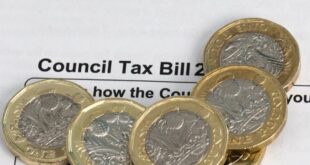Financial changes are coming this month which will have an impact on South West households’ finances. They include changes to energy bills and mortgage rules with deadlines coming up affecting Tax Credit households and anyone using old stamps to send mail.
Economists will be keeping a close eye on the next set of inflation figures too. Keeping on top of your finances has never been more important, as the cost-of-living crisis continues to stretch wallets up and down the region.
Here, we explain seven key changes and how they affect your money, according to The Mirror:
Ofgem price cap falls – July 1
The Ofgem price cap falls to £2,074 a year for a typical household paying by direct debit from July 1. At the moment, the average household with typical energy consumption pays £2,500 a year under the Energy Price Guarantee.
This is good news as it means energy bills will fall – however, the drop will be far less in reality as the £400 energy discount people got last winter has now come to an end. The Ofgem price cap limits what you pay for each unit of gas and electricity you use, plus the maximum daily standing charge.
There isn’t a total amount on how much energy you pay – the headline figures are used to illustrate what someone with typical usage can expect to pay over a year. You can end up paying more or less, depending on how much energy you use.
Last day to receive £150 cost-of-living payment – July 4
Millions of people in receipt of certain disability benefits are currently being sent a £150 cost-of-living payment. The payments are arriving in bank accounts between June 20 and July 4.
You need to have been claiming a qualifying benefit on April 1, 2023 in order to receive the cash. However, some payments may be made after July 4 if you are currently waiting for a benefit claim to be approved and it can be backdated.
The list of qualifying benefits are:
-
Disability Living Allowance
-
Personal Independence Payment
-
Attendance Allowance
-
Scottish Disability Benefits (Adult Disability Payment and Child Disability Payment)
-
Armed Forces Independence Payment
-
Constant Attendance Allowance
-
War Pension Mobility Supplement
New mortgage rules – July 10
Mortgage borrowers who are approaching the end of their fixed-rate deal will have the chance to lock in a deal up to six months ahead. It comes as part of a new set of measures delivered through the mortgage charter and will come into effect on July 10.
A number of lenders already allow customers to lock-in a deal up to six months before but all lenders signed up to the mortgage charter will now have to offer this. There are more than 30 lenders signed up to the mortgage charter.
Homeowners will also be able to ask for advice on repayments, change their mortgage to interest only, or extend the length of their loan, without affecting their credit score.
Inflation – July 19
The Office for National Statistics (ONS) will release the inflation rate for the 12 months to June on July 19. Consumer Price Index (CPI) inflation is a figure used to explain how much the prices of goods and services have increased over time.
When inflation is high, it means prices have risen more sharply and you’re getting less for your money than before. CPI inflation was 8.7 per cent in the 12 months to May – the same as was recorded in April, despite analysts expecting it to fall.
Inflation is down from the 41-year high of 11.1 per cent recorded in October last year but isn’t dropping as fast as economists had hoped.
Deadline to renew tax credits – July 31
If you are in receipt of Tax Credits, you have until July 31 to renew your claim. HMRC has finished sending out Tax Credit renewal packs – but if you haven’t received yours in the post, you can still call up and ask for one to be sent.
Tax Credit claimants must renew their claim every year – or risk their benefit being stopped.
You can do it online through your GOV.UK account or you can use the HMRC app .
You can also call the HMRC Tax Credit helpline on 0345 300 3900 or post back the renewal pack you are sent by HMRC.
Stamps – July 31
Royal Mail has replaced classic stamps with ones that contain barcodes – and you have until July 31 to use up any olds stamps. There was originally a deadline to use up your old stamps by January 31 but the Royal Mail has since introduced a “grace period” of six months.
If you try and post something with an old stamp after this date, it will be treated as having insufficient postage and you may need to pay a fee. For example, sending a letter or large letter currently incurs a £2.50 fee where no postage has been paid at all on a regular sized or large letter.
The only stamps you can continue to use after July 31 are “special stamps” issued to commemorate anniversaries and events, as well as Christmas stamps.
Consumer Duty – July 31
The Financial Conduct Authority (FCA) will introduce new Consumer Duty rules from July 31 for new and existing products and services that are open for sale or renewal. The idea is that more pressure will be placed on firms to deliver good outcomes for customers.
As part of the new measures, customers should only be offered products that are suitable for them, and terms and conditions will need to be simplified. Consumer Duty will also require firms to prove they are offering fair value in relation to the price of the product and the benefits it offers.
Communication between companies and customers will also need to be clearer, so that customers can make informed decisions about a product.


